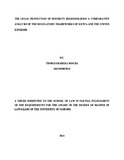| dc.description.abstract | Minority shareholders in Kenya find it difficult to protect themselves against excesses of
majority shareholders because of a number of reasons. First there is an inability to enforce
criminal and civil laws against directors who use their office to expropriate members’
investment. Second is the continued reliance on common law which places a high threshold
on minority shareholders who wish to exercise their rights against majority shareholders.
Third is a weak and obsolete legal framework coupled with corruption and political
interference in the management of corporations. Fourth is the existence of a corporate
governance code that was copied from other jurisdictions but not harmonized to reflect local
conditions.
This has been compounded by the restrictions imposed by the rule in Foss v. Harbottle and
its exceptions which have tended to control the extent to which English and Kenyan courts
could interfere in the internal management of registered companies for close to 170 years.
Although the courts have been reluctant to intervene in the internal management of
companies, there has been a tendency to strike a balance between excessive interference on
the one hand and protection of minority shareholders rights on the other hand. The court’s
intention has been to find an appropriate balance between majority rule and the protection of
minority shareholder rights and interests.
This study examines the extent to which minority shareholders are protected against the
nefarious conduct of controlling majority shareholders and the company’s directors in Kenya
as compared to the United Kingdom. It also explores the agency problems affecting CMC
Holdings; a company incorporated in Kenya, to illustrate how the oppressive conduct of the
controlling majority shareholders in Kenya has the ability to injure a prosperous company
and the interests of minority shareholders. It also makes a comparative analysis of the
existing legal remedies under the common law, principles of equity and the Companies Act,
2006 of the UK and the Capital Markets Act (Cap 485) and the Companies Act of Kenya,
1962 to identify best practices that can be used to reform corporate law in Kenya.
The findings can be adopted to reform the regulatory framework for protecting minority
shareholders in Kenya. Some of these recommendations include the amendment of the
Companies Act to: relax the rules of procedure for filing derivative action; enable minority
shareholders to file for an action for an equitable remedy to wind up a company, on just and
equitable grounds; and, provide for use of alternative dispute resolution mechanisms to
resolve conflicts in corporate governance. | en_US |

